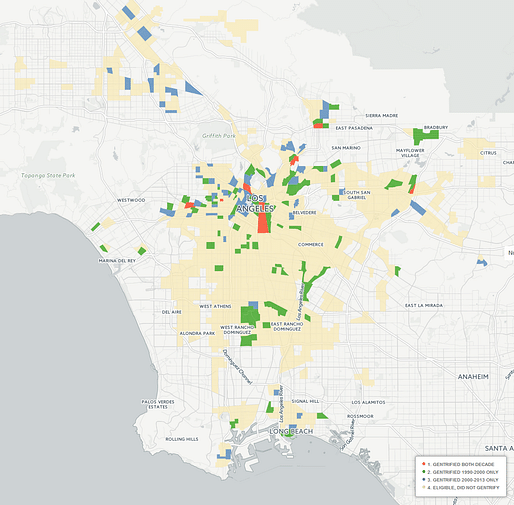anchor
Mapping how LA's expanding Metro network fuels gentrification (or not)

The Urban Displacement Project on gentrification and displacement in urban communities is a joint research effort of UCLA and UC Berkeley. (Image via urbandisplacement.org)
Researchers from the Urban Displacement project, a joint UCLA and UC Berkeley effort, recently released a gentrification map of Los Angeles.
They examined the city from 1990 to 2000 and up to 2015, focusing on neighborhoods near transit stops. The goal was to see if these areas saw higher rents and more displacement than other areas.
The answer? Yes — with some exceptions.
— scpr.org
Some of the UCLA researchers' key findings for Los Angeles Country (via the project's website, urbandisplacement.org):
- Our analysis found that areas around transit stations are changing and that many of the changes are in direction of neighborhood upscaling and gentrification.
- Examining the changes from 2000 to 2013, we find that relative to non-transit areas, transit neighborhoods are more associated with higher increases in whites, college educated, higher income households and greater increases in the cost of rent. Conversely, transit neighborhoods are associated with greater losses in disadvantaged populations including individuals with less than a high school diploma and lower income households.
- The impacts of changes vary across locations but the biggest impacts seem to be around the Downtown areas where transit-oriented development interacts with other interventions aiming to revitalize the urban form.
Click here for the interactive LA map. — Looking for the SF Bay Area map instead? There you go.
Related stories in the Archinect news:
Similar articles on Archinect that may interest you...


2 Comments
So, the implementation of big plans has all kinds of consequences that may involve trade-offs.
Next up: Water is wet.
The danger here is anti gentrification can become a justification for racial disparity in providing civic necessities such as transit, schools or parks. I can see crooked politicians using this to further the status quo that residents don't want good city services because they fear gentrification. Studies like this can be twisted to create a false logic that will continue the divestment in neighborhoods that are predominantly poor and of a racial or ethnic minority.
What we need is an aggressive plan to help people become urban homeowners in areas about to gentrify so they can cash out and move or benefit from the new improvements. Renters are always getting screwed by gentrification.
Over and OUT
Peter N
Block this user
Are you sure you want to block this user and hide all related comments throughout the site?
Archinect
This is your first comment on Archinect. Your comment will be visible once approved.